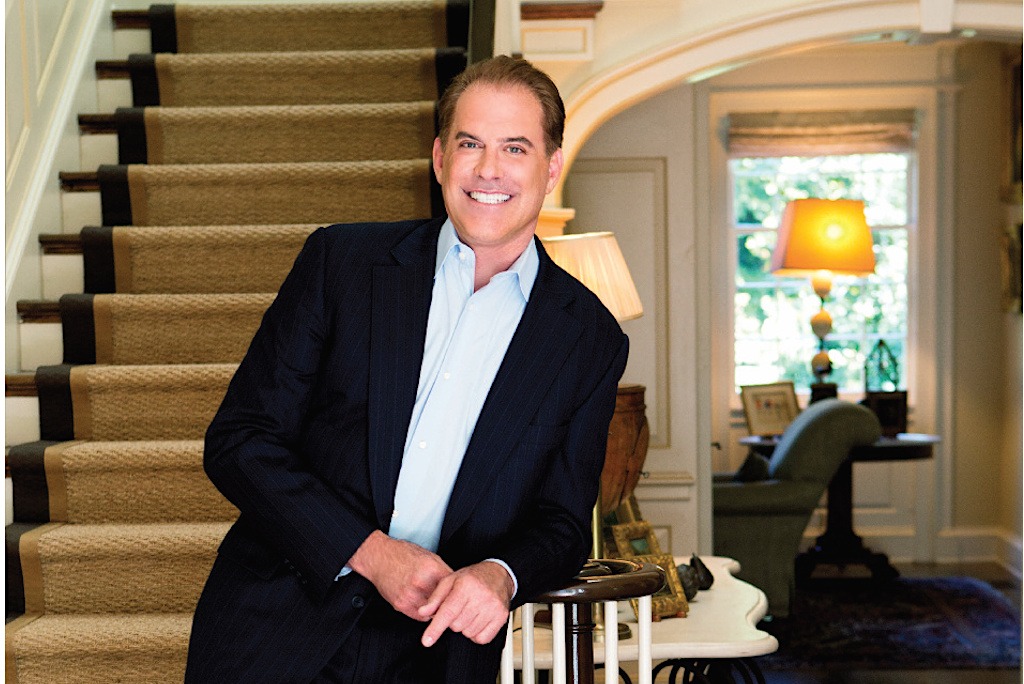To call Timothy Corrigan a Renaissance man would be a gross understatement. Corrigan works in so many facets of the interior design world, it’s difficult to keep us with his boundless and prodigious output.
Interior designer extraordinaire, his work has been published in every major shelter magazine including Elle Décor, Architectural Digest, Luxe, Vanity Fair, Town and Country, and he was named one of the top interior designers in the AD 100 list and the prestigious Robb Report. In case Corrigan wasn’t busy enough creating gorgeous interiors for his clients around the globe, he designs fabrics for Schumacher, wallpaper for Fromental, and furniture, tableware and porcelain, fabrics, rugs, candles, and bathroom fixtures.
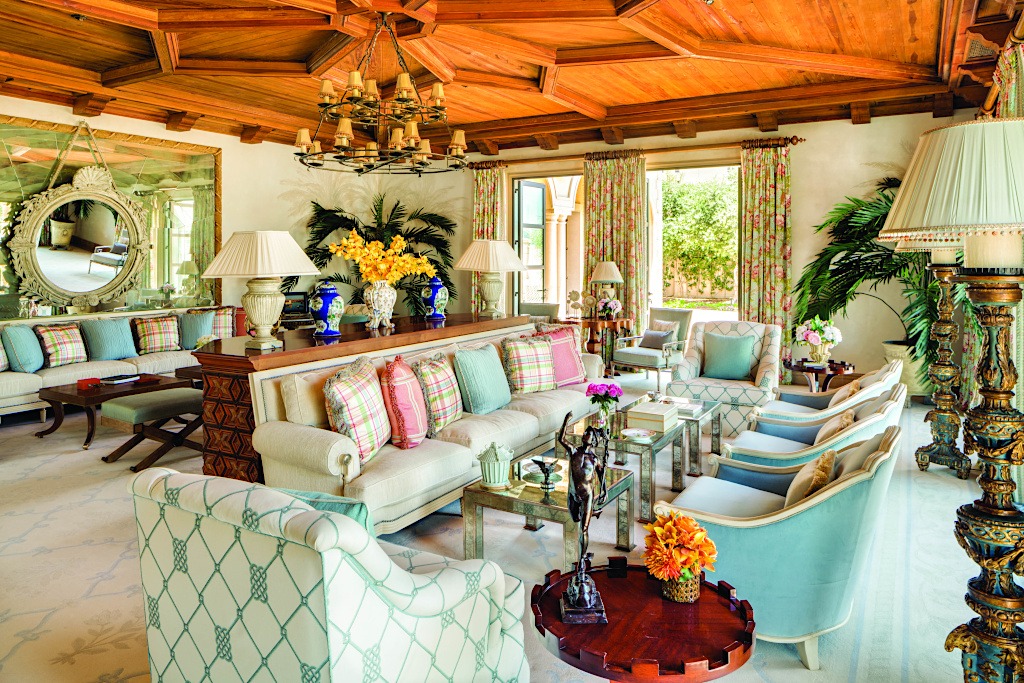
Palm Beach Inspired Living Room
Photo: Mark Luscomb-Whyte
Wait, there’s more. An obsession with French chateau’s, Corrigan is in the midst of a gut renovation of a chateau in the Loire Valley. An intimate look at the incredible renovation of his first chateau restoration is explored in sumptuous photos in the book An Invitation to Chateau du Grand-Luce plus Corrigan has another book debuting later in 2019 with a selection of recently completed interiors. Gregarious and outgoing, Corrigan has the perfect onscreen persona, he has been featured on HGTV and the show Open House on NBC. He also frequently appears in videos from various home design sites and blogs, including Quintessence.
Corrigan is an avid Francophile and has lived in Paris for a number of years. Having grown up in Southern California he elegantly combines his relaxed California style with the formal French sensibility he acquired later on.
Corrigan took some time from his busy schedule to discuss his life, work, and what he’s up to next.
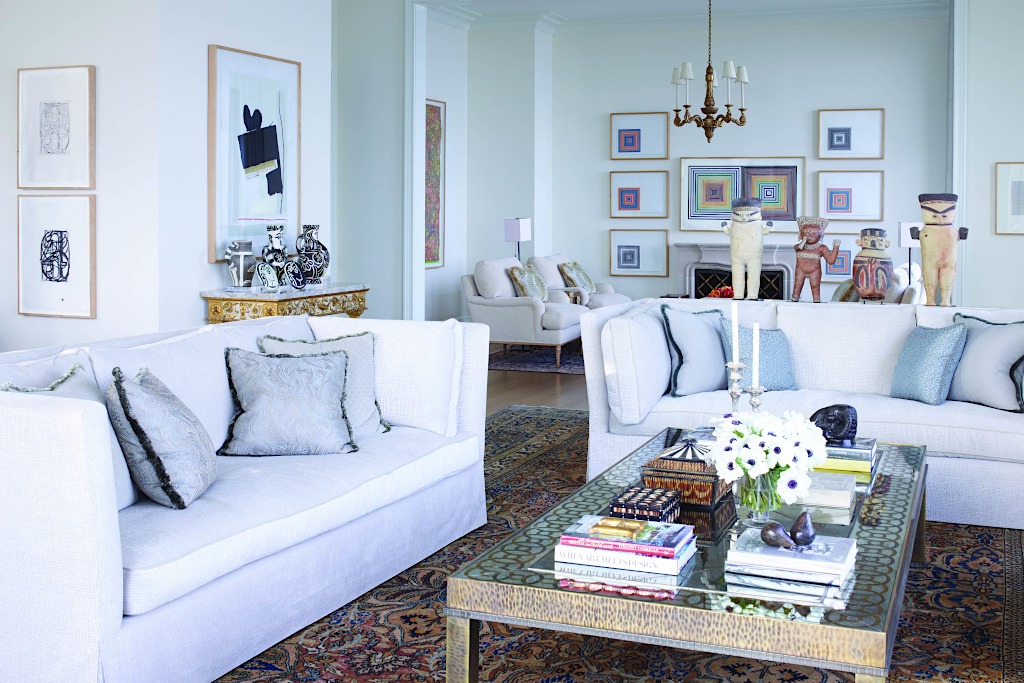
Chicago Penthouse
Photo: Simon Upton
Where were you born and where did you grow up?
The first five years of my life were spent in New Orleans and Cuernavaca, Mexico. Most of my childhood was spent in California.
What did you want to be when you grew up? Were there any early markers or influences in home design in your childhood or in your teenage years?
As a boy I was fascinated by architecture. I designed houses out of balsa wood and even created the landscaping around them. When I was ten or eleven I saw a photo of Frank Lloyd Wright’s famed Fallingwater and I was awestruck. I was so impressed with the way Wright integrated the exterior elements into the house itself. I was lucky enough to have great exposure to the arts as a child. My mother constantly took us to museums and that early exposure established my connection with art and culture.
You had a successful career in advertising at a top firm, why the switch to interior designer?
In the early 90’s when I was living in Paris and working in the advertising business; living in Paris opened up my eyes to the importance that architecture and design plays in our everyday existence. I started noticing details on buildings or in rooms that I had never noticed before. I started going to the Drouot auction house in Paris and weekends at the Paris flea market. My flat in Paris was published in design magazines and people began to ask me if I would help them do their homes. I did this while continuing to work in advertising…but started to realize that I enjoyed my secondary job more than my main “day” job!
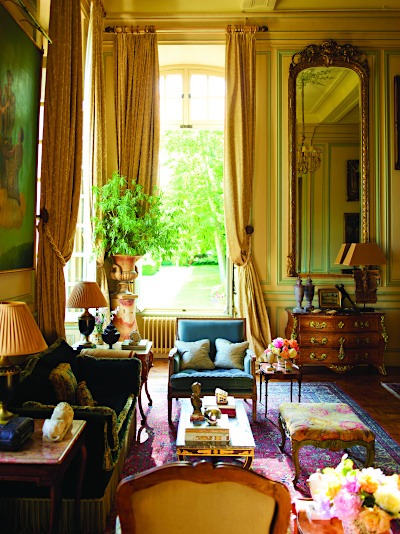
Sitting Room in a Bedroom at the Château du Grand-Lucé
Photo: Eric Piasecki
Who and what was your first professional design commission and what was the experience like?
One of my early projects was working for Madonna on a wonderful 1920’s Wallace Neff house in Beverly Hills. The project proved to be somewhat of a baptism by fire and if nothing else, I proved to myself that I could make it as a professional in my new chosen field.
Did you have a clear sense of your design style when you first started out or did you let clients specify what they wanted?
I have always gravitated towards a mix of European elegance with California casual, and incorporating antiques into my designs. That said, I do like to involve my clients in the design process by giving them lots of options and we build the room together. At the end of the project they feel a greater sense of satisfaction, that their home is a reflection of their taste, and not just something imposed by me.
But more importantly, the first thing I’ll ask a client is, “What’s going to get you to actually use your home?” Not infrequently, the answer contravenes all expectations of what a particular space should be. I don’t necessarily believe in rules when it comes to interior decoration, but this one is ironclad: Don’t let conventional notions of what a room should be dictate how you use it; instead, decide how you want to use a room, and let your desires shape what it becomes. For me, that’s the first step in creating a home that will nurture you.
A major personal project of yours was buying and restoring a chateaux in the France. Can you please share with us what the process was like?
I started out by restoring a 17th century manor house in Normandy and then went on to work on a succession of chateaux throughout France. The restoration of Château du Grand-Lucé, was one of the most challenging design projects that I have undertaken. Respecting the history of an 18th century historical landmark while successfully making it fresh and functional for the way that we live today was an incredibly rewarding multi-year labor of love. I love the challenge of a restoration project, and the satisfaction of preserving a bit of French history.
You eventually sold the chateau, saying that you didn’t spend enough time in it, yet you purchased another chateau in the Loire. I guess you couldn’t resist the temptation. What’s the new chateau like and how is the renovation going?
What can I say? I am a bit of a chateau junkie and love the process of bringing these sleeping beauties back to life. My new property is the Château de la Chevallerie in the northern part of the Loire Valley; it is a mix of 17th, 18th and 19th centuries, but with a real nod to the style of Louis XV. The restoration includes new slate roofs, plumbing, electricity, landscape, etc. For the most part, it had not been touched since just after the Second World War. We have a great team of talented craftsmen working on the project and I hope to have it done by the end of the year.
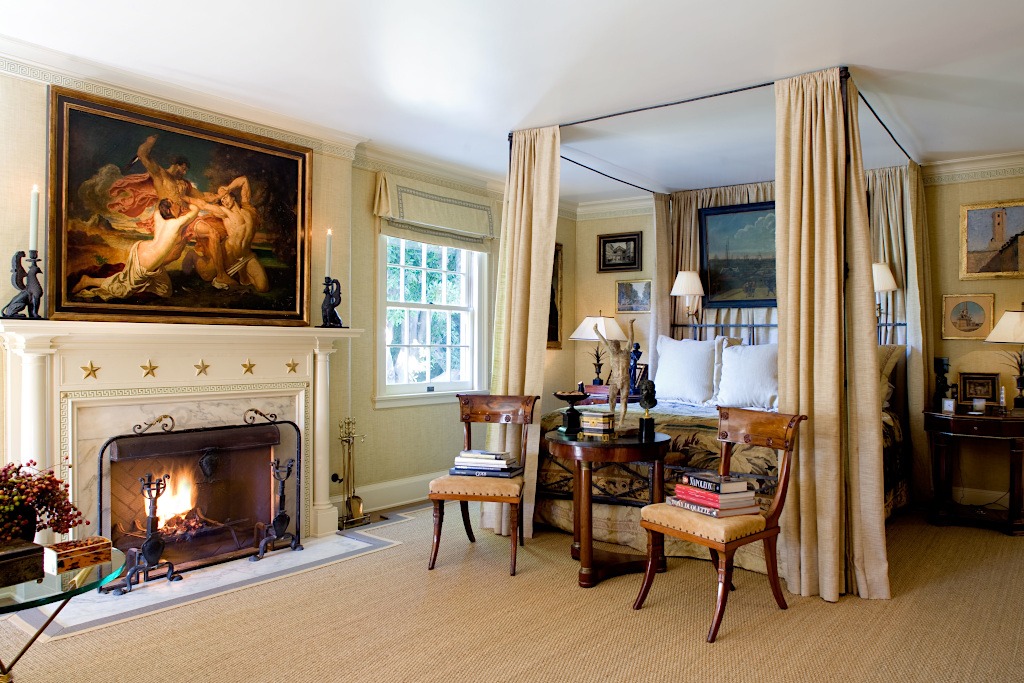
Timothy’s Bedroom in Los Angeles
Photo: Roger Davies
If you could live in one home, either past or present, what would it be? Would you redesign it or leave it exactly how it is?
My all-time favorite home was the late Hubert de Givenchy’s gorgeous hôtel particulier in Paris. Everything about it was both luxurious and comfortable. There was such a wonderful mix of objects that reflected his many diverse interests. In short, it was the home of a very accomplished man of the world with impeccable taste…what more could I ask for?
What are some of your current design projects?
We are currently designing a seven-story private yacht, starting with a steel hull from a British battleship! We just finished installing the US Ambassador’s private residence in Paris. We are also working on a beautiful Paul Williams mansion in Beverly Hills, a 5th Avenue NYC apartment, a contemporary estate in Dallas, and a new design/build of a French style home in Michigan. Additionally, I am designing a second fabric collection for Schumacher and a great collection of indoor/outdoor rugs and fabrics for Perennials.
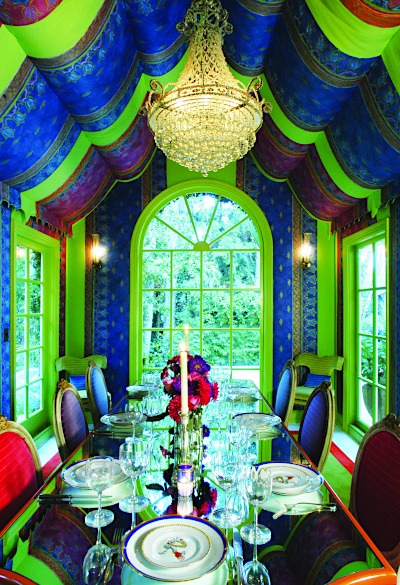
Whimsical Dining Room in the Hollywood Hills
Photo: Michael McCreary
Are there new design trends you like and are there any you dislike?
Absolutely everything is on a pendulum progressing from one extreme to another. Sometimes when you get too close it can be difficult to see that inevitable swing. In design it is very clear that we have shifted away from extreme minimalism and are currently at the mid-point of boho chic. It is only a matter of a year or two before we shift towards a greater sense of classicism and then shift on to exuberant maximalism. Like it or not, history does repeat itself. For me, the “forever classic” is all about getting scale and proportion right…whether it be in a piece of furniture or an entire room. When you get that right, it always looks better…regardless of the style.
Your first book, An Invitation to Château du Grand-Lucé, was about the last chateau that you refurbished. You have another book coming in the fall of 2019. Can you tell us about it?
The book is called The New Elegance and it will feature 11 projects we have done from around the world. It illustrates a new approach to elegance that is layered and livable, including a John Fowler-inspired London townhouse, a Hollywood Regency house in Los Angeles, an art-filled Chicago apartment in the sky, and my own Paris pied-a-terre. Between each chapter are instructive interludes in outlining the building blocks of successful decoration, with fundamental topics such as scale and proportion, symmetry, architectural details, and working with color.
What should we know about you that I haven’t asked about in the interview?
I have insatiable curiosity…a day does not feel complete unless I feel that I have learned or experienced something new. I always want to feel that I am growing and learning.
View on Passport
